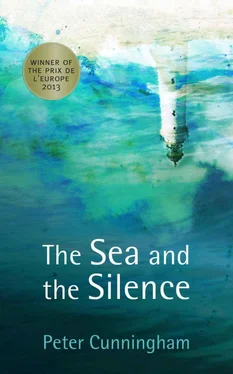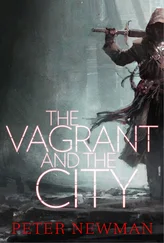Dick Coad sat back from his desk, his memory racing. The journey home from Dublin on the day after Hector’s death had been the loneliest of his life. He had not believed before that he could love her more than he already did. He had been wrong. If he had only had the courage when she had moved to Dublin to follow her, to attend to her every need, to be the friend she relied on most — the thought had pursued him for years. To give her love. ‘My lovely Dick Coad’. The image of the years that they might then have had together seared Dick. What had held him back? Lack of nerve, granted. But was there not something more? Fear of what he did not know?
Dick looked at the second package on his desk. Down on the quayside, out of sight, the hooter of the mud dredger sounded. He had heard the rumours over the early years, of course, the whole town had been alive with them, could speak of little else. Many seemed to think her coming to live in Sibrille — almost amongst them, as it were — was brazen and outrageous. Except for her shopping trips, she was rarely seen, had few friends. It was as if, even at twenty-three, she had lived most of her life before she ever came to Monument. Something she never spoke of, nor indeed had Ronnie, although he must have known.
Picking up the paperknife, Dick slit the wrapping paper.
1943
She came towards me, part of the sunlight, her rich, wavy hair covering her shoulders, and I wondered how anyone could be so beautiful. I was in awe of her. So was everyone in Longstead.
‘Iz? You’ve… done something!’ She stood Bill, the old horse she rode, on the gravel drive. ‘What have you done?’
‘Do you like it?’
‘Oh, God, you’ve cut it all off!’ Bella cried. ‘Turn around!’
I saw my reflection in the French windows as I turned. The sun felt hot on my newly-bared neck.
‘You look like a boy!’ Bella cried as she trotted the horse away in precise crunches. ‘My sister is a boy!’
She would be twenty-three that August and she had come home from London for her party. I was twenty-one. I’d cut my hair short the week before when I’d lain upstairs in bed, drenched in sweat, shivering with a fever. My mother, Violet, made me recite lists to calm my swirling head. The prime ministers of England, the kings and queens, Dublin streets with churches. Bus numbers, characters from Shakespeare.
‘I used marshal lists like soldiers when I was a child,’ she told me. ‘Had it not been for lists, I would have lost my mind.’
When my fever broke, my voice had changed. My mother said I sounded like the breeze that blew in March across the lake at Longstead.
I knew that Bella’s party would be our last as a family, since it was most unlikely that our father would live until my turn came; on the other hand, one never knew. Daddy had been poorly for as long as I could remember. A fall from a horse in his twenties, an undiagnosed ruptured lung, and now his heart. Mother had him carried everywhere since he seldom had the energy to walk. But he had once been young and well and had made the money to buy Longstead from trading in corn. He could still be witty and often retold the times of his encounters with farmers and shippers in Canada and the American Midwest and of the vast potential of Australia, where he had once tended sheep on horseback. Despite his illness, I could now and then catch glimpses of the younger man, a charming companion, a person of intelligence and ambition who had seen much of the world and had loved it.
However, by the time I reached twenty-one, all his business interests had been sold or had otherwise drained away. My brother, Harry, worked in England for a shipping broker, and Allan, the only one interested in farming, had joined the British Army in 1939. Outside our walls, one heard of similar estates as ours being taken over by the Land Commission and carved up between the local farmers who were agitating for more ground. Only the thriving estates would survive, I had heard it said, and the truth was that Longstead, like my father, was slowly dying. Our land was worked-out, our ditches blocked, our fences untended and in our once-rich meadows lay the rotted hay of former seasons.
My mother drove the Ford Victoria down the avenue and onto the public road, which our beeches overhung for a mile. I puffed alight her cigarette and delivered it over, then lit one for myself.
‘Did I remember to tell Mrs Rainbow that Daddy would like her bean soup at one?’
‘Yes, you did.’
‘I’m losing my mind. I don’t remember.
Regardless of season, Mother always went about in old corduroy trousers, flannel shirts, thick pullovers and a hat. She had grown up in the Yorkshire Dales which, she told me, she missed a little every day. From a distance she looked like a scarecrow.
‘You told her, Mother.’
‘My poor head. Last night I had to get up twice and go downstairs to make sure all the lights had been put out.’
Every day, she painted with watercolours; anything that took her from her easel did so with pain. In a horse-drawn trap, she set out as soon after breakfast as she could, and, during the summer, often did not come back until supper-time. On the very worst of mid-winter days, she withdrew to the summerhouse and stayed there until her fingers went numb.
‘No one but me ever thinks of these things. Then we get the bills and must pay for everyone’s forgetfulness.’
‘Are we very short of money?’
‘We are drifting, Iz.’
‘Perhaps I should get a job.’
‘Perhaps we all should.’
My mother sounded the horn and swerved around a cartload of hay being drawn by a horse.
‘Until Allan comes home and takes things in hand, we shall continue to drift. Like a ship without a captain.’
‘What if he decides not to come home?’
Mother’s reply was emphatic. ‘Allan will come home. He’ll come home for his horses and his fishing.’
‘But what if he doesn’t?’
She looked at me. Her hat, one of black straw, was fixed by a gigantic silver pin.
‘Then Bella or you will have to find a suitable husband.’
I burst out laughing. ‘What a thing to say!’
‘I was married at nineteen.’
We pulled in by the grocery store in Tirmon village.
‘When I marry it will be for love,’ I said.
Mr Rafter’s shop supplied Longstead with all its needs. These included the food which we did not ourselves produce, our drink, although we drank modestly, feed for horses and cattle, rubber boots, thick socks, flannel shirts, jackets, raincoats, curtain material, bed sheets and pillow cases, and all the trappings needed to keep a fifteen-hundred acre enterprise, however faltering, on the go. Except for Sundays, no day went by without a transaction with Mr Rafter. He, in turn, played the central role in the sale of Longstead’s beef, lamb and mutton, hay and milk. In a small room at home between the servants’ hall and the main staircase, my father and Mr Rafter spent hours together every other month, following which Mr Rafter would emerge, his hands held in fists at the level of his waistcoat, and say to whosoever of us was there to see him out, ‘I see a definite improvement.’
If money ever changed hands, I was not aware of it.
My mother regarded Mr Rafter’s premises as an extension of Longstead; Mr Rafter always managed to be there to open the door when Mother arrived and to take her list.
‘Mr Rafter.’
‘Good morning, Mrs Seston. Miss.’
The grocer’s eyes were upcurved and naturally conspiratorial. In his mid-fifties, shaped like a sack of grain and with dark hair receding from a shining tan scalp, Mr Rafter was identified with party politics.
Читать дальше












![Edward Ellis - Adrift on the Pacific - A Boys [sic] Story of the Sea and its Perils](/books/753342/edward-ellis-adrift-on-the-pacific-a-boys-sic-s-thumb.webp)